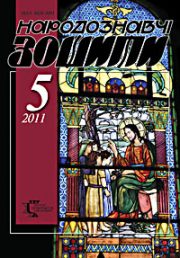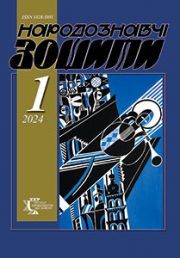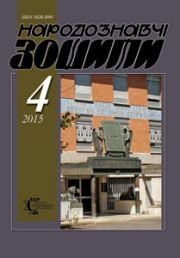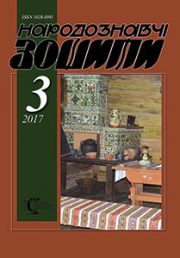The Ethnology Notebooks. 2018, 2 (140), 469—477.
UDK 377.011:745/749.031](477.86-21)
DOI https://doi.org/10.15407/nz2018.02.469
Received 6.02.2018
THE ROLE OF KOSIV CENTER OF ART EDUCATION IN THE PRESERVATION OF TRADITIONAL CRAFTS OF HUTSULSHCHYNA
Chikh-Knysh Bohdana, candidate of arts (Ph. D)
associate professorat the Department of Art History and Humanities,
Kosiv`s State Institute Decorative and Applied Art LNAA.
32 Stephan Bandera str., Kosiv, Ivano-Frankivsk region, 78600, Ukraine
Abstrakt. The center of Kosiv art school, which was formed on the basis of traditional crafts that have been functioning in Hutsulshchyna for centuries, is considered. It is emphasized that during the 20th centuries the forms and educational levels of the academic institution in Kosiv have been changed, though the strategy of teaching that was based on the learning of folk technologies, compositional structures and ornaments was consistent. It contributed to the preservation of pottery, wood-carving, bondarstvo (a kind of woodworking), carpet weaving, cloth-work, mosiazhnytstvo (a kind of artistic metal processing), needlework and furriery. The names of teachers, artists, craftsmen whose creative work favored the preservation of traditional crafts were introduced into the scientific circulation.
Keywords: the center of art education, traditional crafts, folk technologies.
REFERENCES
Dilo. (1923, 20) [in Ukrainian].
Kolos, H. (2002). Pytannia styl’ovoho spriamuvannia navchal’noho protsesu na viddili khudozhn’oi keramiky Kosivs’koho koledzhu imeni V.I. Kasiiana. Mystets’ki studii’02. Kosiv: Pysanyj kamin’ [in Ukrainian].
Kushnir, O. (2016). Rol’ viddilu khudozhn’oi keramiky Kosivs’koho instytutu prykladnoho ta dekoratyvnoho mystetstva u zberezhenni j rozvytku tradytsij vyhotovlennia ta dekoruvannia narodnoi keramiky Hutsul’schyny. Visnyk LNAM, 30. L’viv: LNAM [in Ukrainian].
Laschuk, Yu. (1955). Hutsul’s’ka keramika. Kyiv: Derzhavne vydavnytstvo literatury z budivnytstva i arkhitektury URSR [in Ukrainian].
Nykorak, O. (2012). Dosiahnennia Kateryny Susak. Visnyk LNAM, 23. L’viv: LNAM [in Ukrainian].
Pelypejko, I. (2004). Mistechko nad rybnytseiu. Kosiv: Pysanyj kamin’ [in Ukrainian].
Pryjmak, J. (2007). Istorychni aspekty stanovlennia kosovs’koi shkoly khudozhn’oho riz’blennia. Visnyk LNAM. L’viv: LNAM [in Ukrainian].
Susak, K. (2007). Do istorii zasnuvannia ta stanovlennia kosivs’koi mystets’koi shkoly (z nahody 125-richnytsi diial’nosti). Visnyk LNAM. L’viv: LNAM [in Ukrainian].
Susak, K. & Stef’iuk, N. (2006). Ukrains’ke narodne vyshyvannia. Kyiv: Naukovyj svit [in Ukrainian].
Shmahalo, R. (2005). Mystets’ka osvita v Ukraini seredyny XIX—XX st. Strukturu-vannia, metodolohiia, khudozhni pozytsii. L’viv: Ukrains’ki tekhnolohii [in Ukrainian].
Kosivs’kyj instytut prykladnoho ta dekoratyvnoho mystetstva. Retrieved from: http://lnam.edu.ua/uk/kosiv_institute.html.







